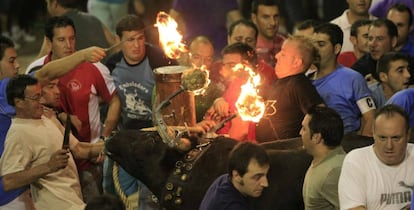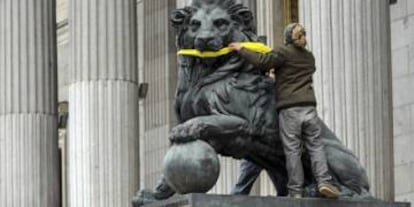Spanish government justifies €210,000 fines for anti-bullfighting protesters
Opposition senator says measures are attempt to use controversial 'Gag Law' to silence activism
The Popular Party government of Prime Minister Mariano Rajoy says the €6,000 fines 30 protestors were each ordered to pay for disrupting the traditional toro embolado or flaming bull event in Olocau del Rei, Castellón in 2015 are “justified” by the controversial Citizen Safety Law, better known to its critics as the “Gag Law,” with many arguing the legislation infringes on basic civil rights.

The government was replying to criticism by Carles Mulet, a senator from the left-leaning Compromis coalition in Valencia in September 2016. Mulet had argued that the size of the fine, the biggest ever for “simply demonstrating against animal cruelty, [had] aimed to silence critics.”
Opposition parties are trying to amend the Citizen Safety Law in Congress
The government argued that the fine was imposed in accordance with articles 36.1 and 37.1 of the law, which refers to: “the disturbance of citizen safety during public acts, sports or cultural events, solemnities or religious services and other meetings attended by numerous people” and to: “the holding of meetings in public places or demonstrations, that don’t comply with the aforementioned in articles 4.2, 8, 9, 10 y 11 of the organic law 9/1983, from July 15, with responsibility lying with the organizers and promoters.”
These latter articles contain references to “orderly behavior in meetings and demonstrations” and applications for permits to hold them.
Mulet argued that the issue was “a fresh attempt to use the so-called Gag Law to silence activists and dissenting opinion over a tradition the Popular Party considers worth conserving and deserving of its support and subsidies.” He also said that the sum of €210,000 – the total of the sanctions – “for the mere act of protesting against animal cruelty at a fiesta” was “outlandish.”
Spain’s opposition parties in November passed a non-binding resolution calling for the government to repeal the Citizen Safety Law – passed when the Popular Party (PP) still enjoyed an absolute majority. The Socialist-sponsored document states that the law should be rolled back because of “its direct and negative impact on the exercise and development of fundamental rights.”
The PP was the only party to vote against the resolution, while the center-right Cuidadanos party abstained.
Bullfighting and other events incorporating the animals remain deeply controversial in Spain, with many saying such spectacles are antiquated and pointing to declining popularity.

English version by Heather Galloway.
Tu suscripción se está usando en otro dispositivo
¿Quieres añadir otro usuario a tu suscripción?
Si continúas leyendo en este dispositivo, no se podrá leer en el otro.
FlechaTu suscripción se está usando en otro dispositivo y solo puedes acceder a EL PAÍS desde un dispositivo a la vez.
Si quieres compartir tu cuenta, cambia tu suscripción a la modalidad Premium, así podrás añadir otro usuario. Cada uno accederá con su propia cuenta de email, lo que os permitirá personalizar vuestra experiencia en EL PAÍS.
¿Tienes una suscripción de empresa? Accede aquí para contratar más cuentas.
En el caso de no saber quién está usando tu cuenta, te recomendamos cambiar tu contraseña aquí.
Si decides continuar compartiendo tu cuenta, este mensaje se mostrará en tu dispositivo y en el de la otra persona que está usando tu cuenta de forma indefinida, afectando a tu experiencia de lectura. Puedes consultar aquí los términos y condiciones de la suscripción digital.








































